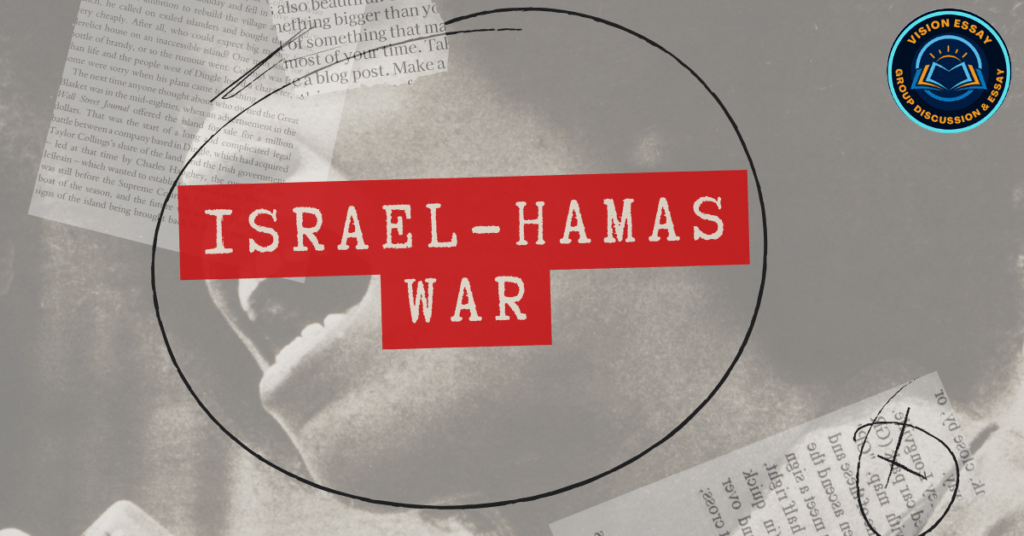
Introduction
The Israel-Hamas War is too old but on October 7, 2023, something changed. Hamas launched thousands of missiles into Israel before daybreak, and hundreds of militants burst over multiple spots in the fence separating the Gaza Strip and Israel to attack, kill, and abduct Israelis mostly in the border towns. Israel and Hamas, the militant Palestinian organization in charge of the Gaza Strip, are at odds right now. Since then, the dispute has been more intense.
What is the History of Israel-Hamas War?
- Creation Of Palestine
- British forces left Palestine in 1948 after being unable to stop Arab and Jewish bloodshed, handing the task of settling the conflicting claims to the newly established United Nations.
- The majority of Arab countries rejected the UN’s proposal to divide Palestine into separate Arab and Jewish states.
- Arab Israel War (1948)
- The Arab governments that were close by launched an invasion when the Jewish state of Israel declared its independence in 1948. Israel had around 50% more area under its control at the end of the war than the UN’s initial partition plan had anticipated.
- UN Partition Plan
- According to the Plan, Jordan was in charge of the West Bank and the holy sites in Jerusalem while Egypt was in charge of the Gaza Strip. However, the Palestinian Liberation Organization was not able to be founded in 1964 as a result of its failure to resolve the Palestinian conflict.
- Palestinian Liberation Organisation (PLO)
- With the intention of liberating Palestine from Israeli and Jewish rule and establishing Muslim Brotherhood supremacy in the Arab world, the PLO was created.
- In 1975, the UN gave the PLO observer status and formally recognized the right of the Palestinian people to self-determination.
- Six-Day War
- During the 1967 war, Israeli troops captured the Sinai Peninsula and Gaza Strip from Egypt, the West Bank and East Jerusalem from Jordan, and the Golan Heights from Syria.
- Emergence of Hamas
- 1987 saw the founding of Hamas, a terrorist branch of the Muslim Brotherhood in Egypt that sought to further its goals via jihadi violence.
- The U.S. government considers Hamas to be a terrorist group. The Palestinian Authority parliamentary elections were won by Hamas in 2006. In 2007, it drove Fatah out of Gaza, dividing the Palestinian organization geographically.
- 1987: The First Intifada (Palestinian Uprising) began as tensions in the occupied West Bank and Gaza reached a breaking point. It turned into a little conflict between Israeli forces and Palestinian terrorists.
- Oslo Accords
- 1993: The Oslo Accords stipulate that both Israel and the PLO would formally recognize one another and forgo using force. The Oslo Accords also formed the Palestinian Authority, which was granted a certain amount of authority in the West Bank and Gaza Strip.
- 2005: Israel starts a unilateral exodus of Jews from Gaza settlements. Israel, meanwhile, maintained a tight embargo on all border crossings.
- UN raised Palestine’s status to a “non-member observer state” in 2012.
- Territorial Disputes of Israel with Neighboring Countries
- West Bank: Between Jordan and Israel is where the West Bank is located. Ramallah, which serves as Palestine’s de facto administrative capital, is one of its major cities. Israel seized possession of it during the war of 1967 and over time built settlements there.
- Gaza: The Gaza Strip, which is sandwiched between Egypt and Israel. Following its occupation in 1967, Israel gave over the authority of Gaza City and day-to-day management of the majority of the region during the Oslo peace negotiations. Israel unilaterally evacuated Jewish colonies from the area in 2005, although it still controls access from abroad.
- Golan Heights: During the conflict with Syria in 1967, Israel took control of the important plateau known as the Golan Heights. In 1981, Israel essentially annexed the region. The Golan Heights and Jerusalem have just received official recognition by the USA as being a part of Israel.
What really happened in Israel-Hamas War?
- Hamas attacked Israel on October 7, 2023, by breaking through Israeli borders using gliders and tunnels, among other tactics, and taking Israeli soldiers by surprise.
- Numerous people were killed in the incident, and it also seriously damaged Israel and injured a number of others.
- The attack took advantage of thought to be a weak period and occurred during a major yearly celebration in Israel.
- In an attempt to neutralize threats and defend its residents, Israel retaliated with airstrikes and ground operations, starting a vicious circle of warfare.
- Israel has declared war on the terrorist organization Hamas and is presently conducting military operations in the Gaza Strip, Palestine, with the goal of completely eliminating them.
How did Israel’s intelligence fail in Israel-Hamas War?
- Even though Israeli intelligence is highly regarded, it seems that a critical error in determining Hamas’s capabilities occurred, which prevented sufficient planning and reaction.
- The Israeli Defense Forces (IDF) may not have been ready for Hamas’s strikes due to a misperception of the danger.
- Although the Israeli military is quite strong against conventional enemies, it finds it difficult to defeat asymmetrical warfare. Because they operate inside civilian communities and use guerilla tactics, Hamas and other such groups pose a serious threat to the traditional Israeli military due to their unorthodox and highly motivated nature.
What is Impact of Israel-Hamas War?
- Many Palestinians will be displaced as a result of this battle, and neighboring nations will face a refugee crisis. There’s a chance that Israel and the Arab world may fight other wars after this one.
- The United States was negotiating a deal to normalize relations with Saudi Arabia and Israel. Nonetheless, Saudi Arabia has halted negotiations as a result of this conflict, which is bad for regional peace initiatives.
- The India-Middle East-Europe Corridor (IMEC), which runs via Saudi Arabia and Israel, may be impacted by this crisis as well. If Saudi Arabia and Israel’s ties do not improve, implementation could not be feasible, which would raise questions regarding the security of IMECs.
- If this conflict drags on and Israel becomes entangled in it, as Russia is currently doing in Ukraine, the IMEC will cease to exist. India will suffer a great deal from this in terms of its interests.
- The war may have an impact on the Middle Eastern nations and their trading partners by disrupting commerce and the world’s supply of crude oil. West Asia supplies more than 20% of the world’s crude oil, and the region’s conflicts might cause prices to soar to as high as USD 150 per barrel.
- By 2024, it is likely that global inflation could reach 6.7%, which would result in a nearly 2% slowdown in global economic development and possibly a global recession that would have a major impact on the US and India.
Also read: Israel Palestine Conflict 2023
What could be Solution To Israel-Hamas War?
- The Two-State Solution
- One of the suggestions that has received the most support is the formation of two states, one Palestinian and one Israeli, with mutually agreed-upon and internationally recognized borders.
- Additionally, the two-state solution seeks to resolve the conflict’s key concerns, including Jerusalem, refugees, settlements, security, and water.
- Numerous foreign leaders, including those from China, India, and the United States, have also endorsed it.
- The One-State Solution
- This strategy proposes a single, binational state with equal representation for Israelis and Palestinians.
- Addressing the issues of both populations while ensuring that no group feels neglected is difficult with this strategy.
- The Confederation Model
- A confederation of two independent nations with common institutions and cooperation in areas like security, the economy, and resources is an idea put up by some. This concept maintains collaboration while allowing for some degree of autonomy.
- International Trusteeship
- In this scenario, the territory would be supervised and governed by an international organization or coalition until a more durable and amicable resolution can be found. The international community would have to work with us to implement this strategy.
Conclusion
The Israel-Hamas War continues, with Israel maintaining that it is committed to safeguarding the security of its citizens and eliminating Hamas militants entirely. It is certainly difficult to find a solution in this case, but if one can be found, it will need heightened diplomatic efforts supported by international mediation, increasing communication, and cultivating empathy among all stakeholders. Finding a long-term solution is even more crucial in a world where conflicts are rife, underscoring the necessity of coordinated international efforts to promote peace and stability.
Frequently Asked Questions(FAQs)
What is the reason behind Israel-Hamas War?
Human rights organizations have long bemoaned the appalling conditions facing residents in the Gaza Strip, where Israel has shut off its own supplies in order to launch a retaliatory strike against Hamas in response to the terror acts carried out by the Palestinian terrorist group on October 7.
Do Palestinians support Hamas?
Notable variations in demographics can also be found in the most recent replies. Compared to 23 percent of respondents 30 and older, thirty-three percent of persons under 30 said they supported Hamas. Furthermore, Gazans with lower incomes had a lower propensity to back Hamas than those with higher incomes.
Who funds Hamas?
Apart from the money it gets from Iran, Hamas makes enormous profits from its international investment portfolio. Its holdings, which are reported to be worth hundreds of millions of dollars, include businesses that operate in Sudan, Algeria, Turkey, the United Arab Emirates, and other nations.
What do Hamas want?
Based on the tenets of Islamism, Hamas advocates for Palestinian nationalism within an Islamic framework and has conducted an armed battle, or jihad, against Israel. Its two wings are the Izz ad-Din al-Qassam Brigades, a military branch, and Dawah, a social service wing.
Sources:
- 2023 Israel–Hamas war – Wikipedia
- https://www.thehindu.com/news/international/israel-hamas-war-1500-bodies-of-hamas-militants-found-around-gaza-strip-says-israel-army/article67403115.ece
- https://indianexpress.com/article/world/israel-hamas-war-what-has-happened-what-caused-the-conflict-your-faqs-answered-8981355/
- https://www.drishtiias.com/daily-updates/daily-news-analysis/israel-palestine-conflict-1#:~:text=1987%3A%20Founding%20of%20Hamas%2C%20a,its%20agenda%20through%20violent%20jihad.&text=1987%3A%20Tensions%20in%20the%20occupied,First%20Intifada%20(Palestinian%20Uprising).
